constituent assembly of india debates (proceedings)- volume vii
constituent assembly of india debates (proceedings)- volume vii
constituent assembly of india debates (proceedings)- volume vii
Create successful ePaper yourself
Turn your PDF publications into a flip-book with our unique Google optimized e-Paper software.
succession duties. This will also give to the Federal Government a direct interest in the duty. Subject to<br />
what we have said in paragraph 49 about taxes on agricultural property, we recommend that not more<br />
than 40 per cent <strong>of</strong> the net proceeds <strong>of</strong> such duties should be retained by the Centre.<br />
43. We recommend the continuance <strong>of</strong> the status quo, i.e., the legislation in respect <strong>of</strong> the duties on<br />
the specified documents should be Central but Provinces will collect and retain the duties.<br />
44. These taxes are not suitable except for purely local purposes, i.e., for the benefit <strong>of</strong><br />
municipalities, pilgrim funds, etc., but they can be conveniently levied and collected only by the Centre.<br />
The existing provisions may stand.<br />
Grants-in-Aid and Subventions<br />
45. Item II <strong>of</strong> our terms <strong>of</strong> reference refers to Grants-in-aid. Assam and Orissa now get fixed<br />
subventions <strong>of</strong> Rs. 30 and Rs. 40 lakhs per annum, respectively. The recommendations that we have<br />
made for the increase in the Provincial share <strong>of</strong> income-tax and the transfer <strong>of</strong> a share in the excise on<br />
tobacco will increase their revenues substantially like those <strong>of</strong> other Provinces. Even so, however, we<br />
have little doubt that these two Provinces will still require fixed subventions on higher scales than at<br />
present.<br />
The position <strong>of</strong> East Punjab is peculiar. Everything there is unsettled, and it will take some time for<br />
things to settle down. It is clear, however, that this Province will require a substantial annual subvention<br />
for some time to come.<br />
The position <strong>of</strong> West Bengal is uncertain, and it is not clear how her finances will shape as a result <strong>of</strong><br />
the partition. The liability that she will have to take over as a result <strong>of</strong> the partition is not yet known. All<br />
told, however, she will perhaps need some temporary assistance.<br />
46. For lack <strong>of</strong> time and data, we have not been able to assess the subventions required by these<br />
four Provinces. We, therefore, recommend that the Central Government should immediately take up the<br />
question so that the amounts required by each <strong>of</strong> these Provinces may be determined in time. The<br />
amounts should be subject to periodical review by the Finance Commission to which we refer later.<br />
47. We have suggested elsewhere that till the Finance Commission has been able to recommend a<br />
better basis <strong>of</strong> distribution, a part <strong>of</strong> the divisible pool <strong>of</strong> income-tax should be used in order to mitigate<br />
hardship in individual cases. The provision also contains an element <strong>of</strong> grants-in-aid.<br />
48. It is clear that during the developmental stages <strong>of</strong> the country it will be necessary for the Centre<br />
to make specific purpose grants to the Provinces from time to time. The provisions <strong>of</strong> clause 203 <strong>of</strong> the<br />
Draft Constitution seem to be adequate for the purpose. We have considered the question whether, as in<br />
Australia, grants should be made in order to equalise, or at any rate to reduce the disparity between the<br />
levels <strong>of</strong> services and <strong>of</strong> severity <strong>of</strong> taxation in the different provinces. There is undoubtedly something<br />
attractive in seeking to bring up the backward units at least to 'average' standards, both in effort<br />
(severity <strong>of</strong> taxation) and in performance (standards <strong>of</strong> services). In Australia, the maximum difference<br />
between the levels is said to be <strong>of</strong> the order <strong>of</strong> 20 per cent and the number <strong>of</strong> unit States is small. In<br />
India, on the other hand, as for example in the U.S.A., the difference in the levels is very wide and the<br />
number <strong>of</strong> units larger when acceding States come into the picture. In such a background 'averages'<br />
would be mere mathematical concepts totally unrelated to actual facts. On the other hand, even in a<br />
Federation <strong>of</strong> autonomous units, there is a great deal to be said for helping the less prosperous units to<br />
come up to the level <strong>of</strong> the more prosperous ones. As in all such matters we must take a realistic<br />
decision with reference to the conditions in our country. While we do not recommend the adoption in this


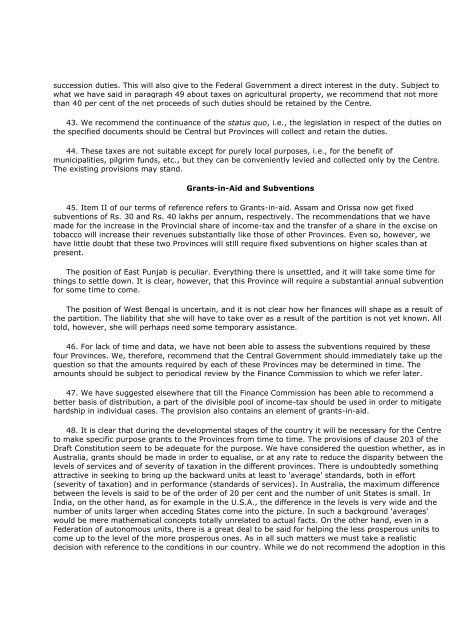
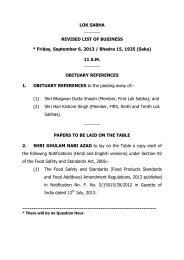
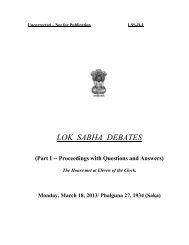
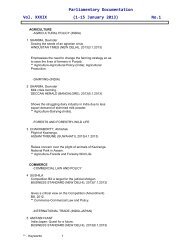
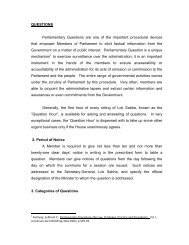
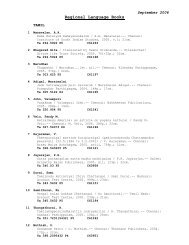
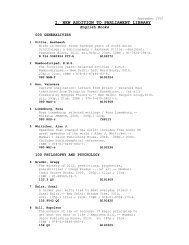
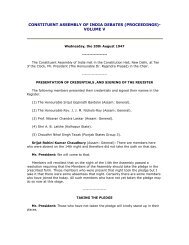
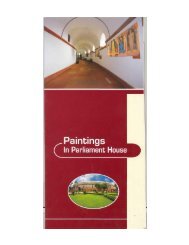
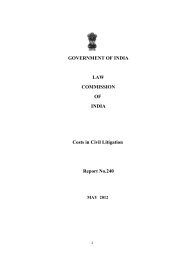
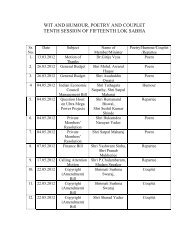
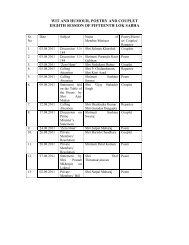

![gÉÉŌ A.]ÉŌ. xÉÉxÉÉ](https://img.yumpu.com/8015720/1/190x245/geeo-aeo-xeexee.jpg?quality=85)
